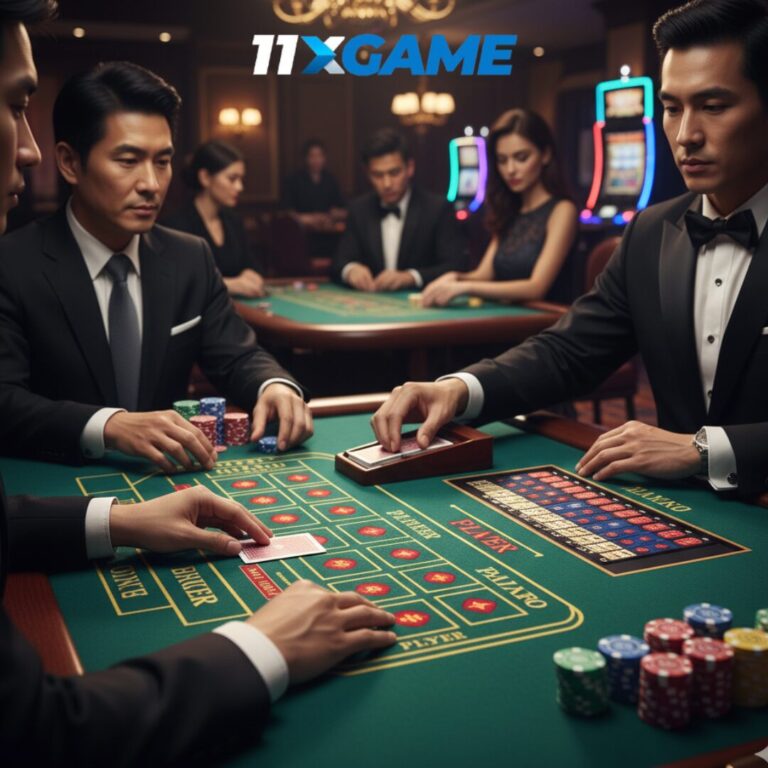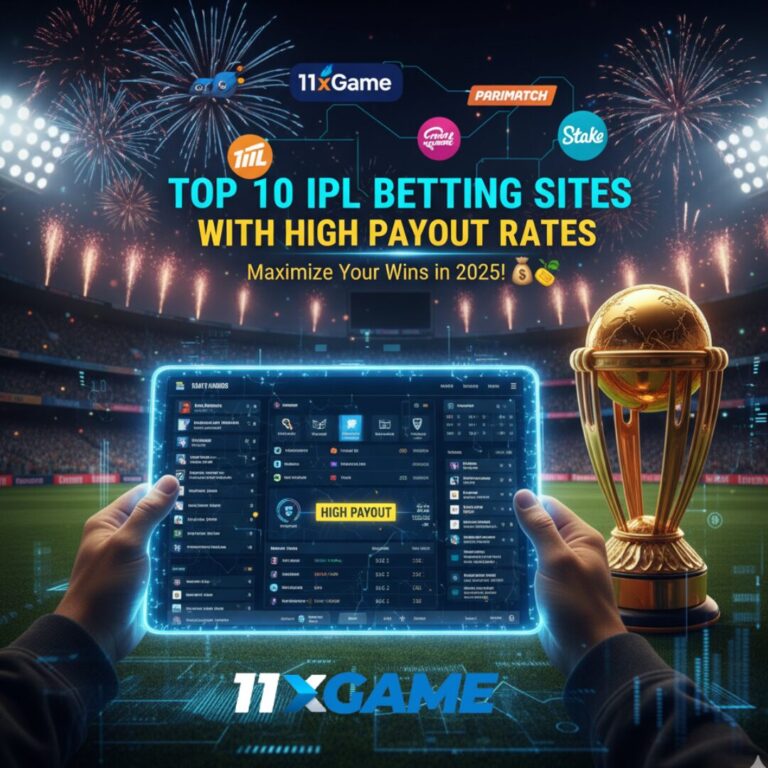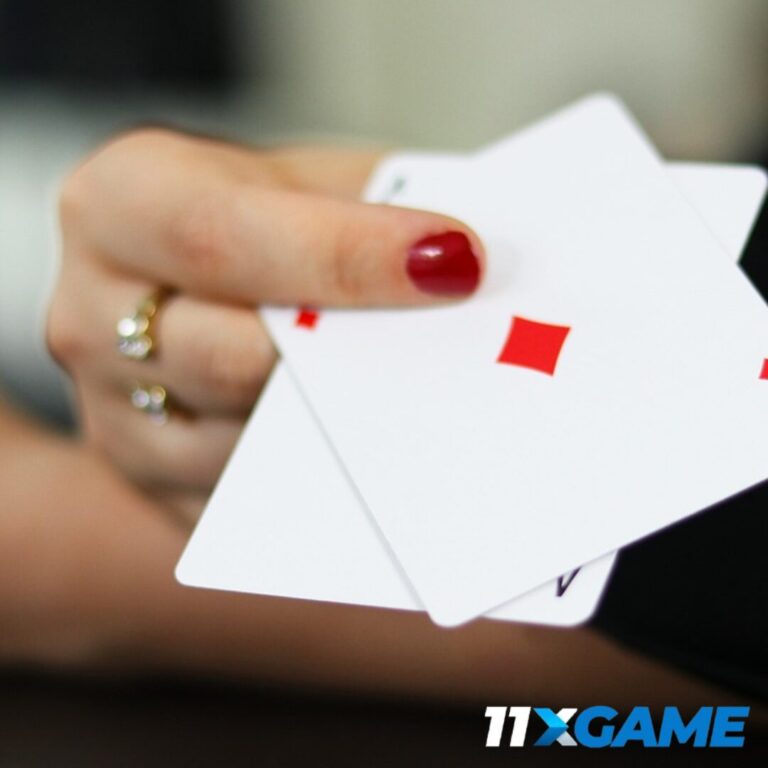Discover the Hidden Power of Self Exclusion in Gambling: 7 Life-Changing Strategies You Need to Know
Self exclusion in gambling is a powerful tool that many people overlook when trying to regain control over their betting habits. In today’s fast-paced world of online casinos and sports betting, it’s easy to get caught up in the thrill, but sometimes, stepping back is the smartest move you can make. This blog post dives deep into what self exclusion in gambling really means, how it works, and why it could be the game-changer you’ve been searching for. Whether you’re dealing with occasional overindulgence or something more serious, understanding self exclusion in gambling can open doors to a healthier relationship with betting.
If you’ve ever felt that rush of placing a bet but later regretted the time or money lost, you’re not alone. Millions around the globe face similar challenges, and self exclusion in gambling offers a voluntary way to hit the pause button. It’s not about quitting forever—though it can be—but about creating boundaries that protect your well-being. Let’s explore this concept step by step, with real insights and practical advice to help you navigate it.

The Basics of Self Exclusion in Gambling Explained
Self exclusion in gambling refers to a voluntary program where individuals choose to ban themselves from participating in gambling activities for a set period. This could mean excluding yourself from physical casinos, online betting sites, or even specific types of games like slots or sports wagering. The idea is simple yet effective: by removing access, you reduce temptation and give yourself space to reflect and rebuild.
Originating from responsible gaming initiatives, self exclusion in gambling programs started gaining traction in the 1990s in places like the UK and various US states. Gaming commissions and regulators saw the need to support players who recognized their own risky behaviors. Today, it’s a standard feature in regulated markets, backed by laws that ensure casinos and operators honor these requests.
Think of it like a self-imposed timeout. When you sign up for self exclusion in gambling, you’re essentially telling the industry, “I need a break.” Operators are legally bound to block your access, close your accounts, and even remove you from marketing lists. This prevents those pesky emails tempting you with bonuses or promotions.
But it’s not just about blocking entry. During the exclusion period, you can’t collect winnings or redeem rewards, which adds an extra layer of accountability. For example, if you sneak in and win a jackpot, that money goes forfeited—often redirected to problem gambling support funds.
How Self Exclusion in Gambling Works Step by Step
Enrolling in self exclusion in gambling is straightforward, but the process varies by location and type of gambling. Here’s a breakdown to make it crystal clear:
- Choose Your Scope: Decide if you want to exclude from all gambling, just online, or specific venues. In the US, states like Pennsylvania offer options for casinos, iGaming, video gaming terminals (VGTs), and fantasy sports.
- Select the Duration: Common periods include 6 months, 1 year, 3 years, 5 years, or lifetime. Shorter terms are revocable after they end, but lifetime ones are often permanent.
- Sign Up: This can be done online, in-person at a gaming commission office, or via mail. You’ll need ID, a photo, and sometimes a notary for mailed forms.
- Activation: Once processed, your details go into a database shared with operators. They must deny you entry, close accounts, and stop marketing.
- Enforcement: If you try to gamble, security might escort you out, and any winnings are voided. Some programs use facial recognition for added security.
Quick Tip: Before enrolling, chat with a counselor via helplines like 1-800-GAMBLER. They can guide you on whether self exclusion in gambling fits your situation. 😊
Operators take this seriously because failing to comply can lead to hefty fines. In the UK, for instance, the Gambling Commission mandates self-exclusion, and tools like GAMSTOP block access to all licensed online sites.
The Benefits of Embracing Self Exclusion in Gambling
Why bother with self exclusion in gambling? The advantages go beyond just stopping bets—they can transform your life. Here’s a bullet list of key perks:
- Regain Financial Control: By halting access, you prevent impulse spending, helping you rebuild savings and avoid debt.
- Mental Health Boost: Breaking the cycle reduces stress, anxiety, and that constant “what if” mindset associated with gambling.
- Time for Reflection: Use the break to explore hobbies, strengthen relationships, or seek therapy without distractions.
- Legal Protection: It’s a formal step that shows commitment, useful if you’re in recovery programs or dealing with family concerns.
- Community Support Integration: Many programs link to counseling, making it easier to address underlying issues.
- Prevent Relapse: Long-term exclusions act as a safety net, especially for those with addictive tendencies.
- Positive Ripple Effects: Users often report improved sleep, productivity, and overall happiness.
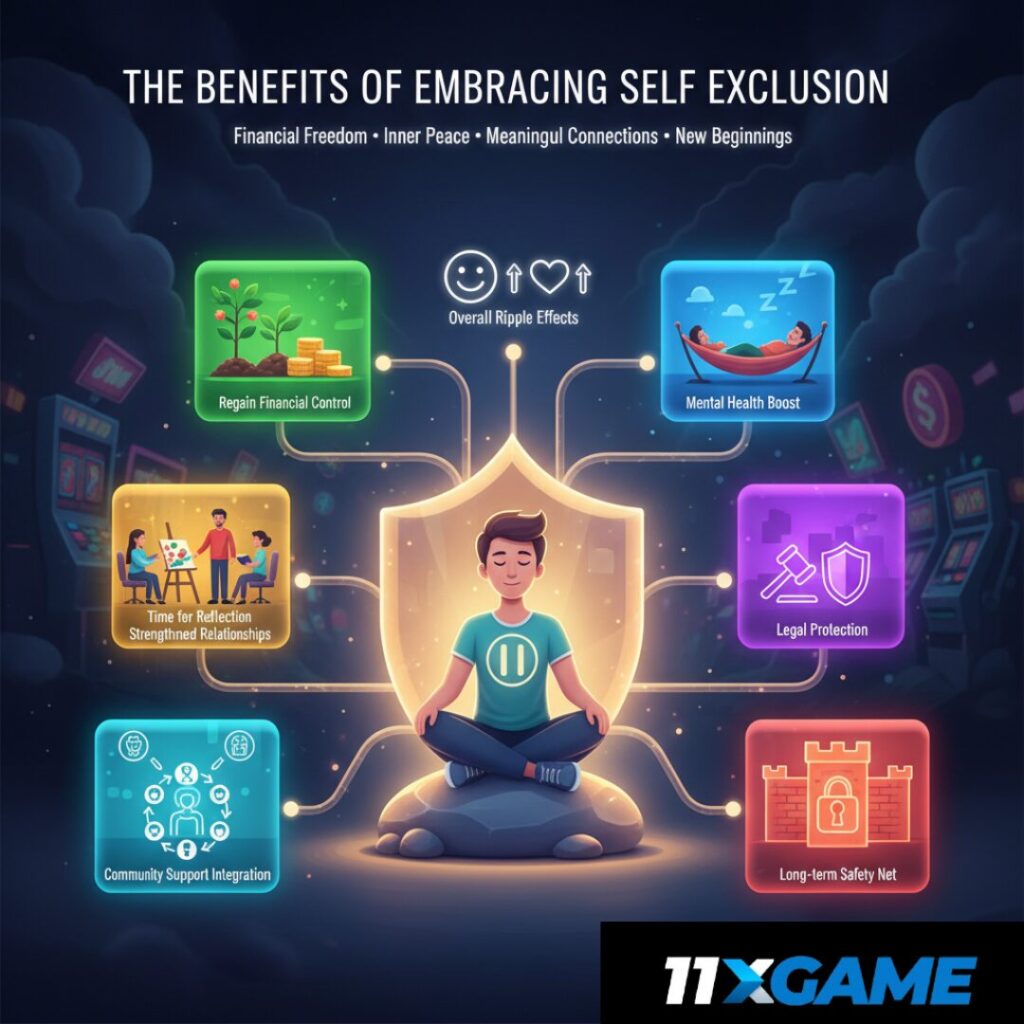
Studies show that 84% of GAMSTOP users in the UK felt safer and more in control after self-excluding. That’s real impact!
Potential Drawbacks and How to Overcome Them
No tool is perfect, and self exclusion in gambling has its challenges. For starters, it doesn’t cover unregulated or illegal sites, so temptation might linger if you’re not vigilant. Also, the emotional hit of admitting a problem can feel daunting at first.
Another issue: enforcement isn’t foolproof. Some people find ways around it, like using fake IDs, which defeats the purpose and could lead to legal troubles.
To counter this, combine self exclusion in gambling with software blockers that restrict access to gambling websites on your devices. Apps like BetBlocker or Freedom can add an extra layer.
Remember, it’s voluntary, so sticking to it relies on your willpower. If you relapse, don’t beat yourself up—many programs allow renewals or extensions.
Self Exclusion in Gambling Across Different Regions
Self exclusion in gambling isn’t one-size-fits-all; it varies by country and state. Let’s compare some key areas in a table for easy reference:
| Region | Program Name | Duration Options | Coverage | Key Features |
| UK | GAMSTOP | 6 months, 1 year, 5 years | Online gambling only | Free, blocks all licensed sites |
| Pennsylvania | PGCB Self-Exclusion | 1 year, 5 years, lifetime | Casinos, iGaming, VGT, Fantasy | Online signup, office visits |
| New Jersey | DGE Self-Exclusion | 1 year, 5 years | Casinos, online, sports wagering | Video conference option |
| New York | NYS Gaming Commission | 1, 3, 5 years | All state-regulated gaming | Notarized mail-in forms |
| California | BGC Exclusion Program | 1 year, lifetime | Card rooms, non-tribal casinos | Forfeited winnings to public health |
| Colorado | CDG Self-Exclusion | Varies | Casinos, sports betting | PDF application available |
| Massachusetts | MGC VSE | Predetermined terms | Casinos, sports wagering | Dual exclusion for both types |
This table highlights how self exclusion in gambling adapts to local laws. For instance, in the US, it’s often state-specific, while the UK has a national online system.
If you’re in a region without formal programs, check with local casinos—they might offer in-house self-restriction.
Real Scenarios: Stories from Those Who’ve Used Self Exclusion in Gambling
Let’s bring this to life with some anonymized real scenarios. These are inspired by community shares and reports, showing the human side.
Scenario 1: Alex, a 35-year-old office worker, loved online slots but found himself betting more than he could afford after a job loss. He enrolled in a 1-year self exclusion in gambling program via his state’s gaming board. During the break, he joined a support group and picked up running. “It was tough at first, but now I have savings and no regrets,” he shared on a forum.
Scenario 2: Maria, in her 50s, used self exclusion in gambling after her family noticed her casino visits were straining relationships. Opting for a lifetime ban in New Jersey, she redirected her energy to volunteering. “I feel free—like a weight lifted,” she posted in a recovery community.
Scenario 3: Tom, a sports fan, self-excluded from online betting in Colorado after Super Bowl losses piled up. The 6-month period helped him focus on watching games for fun, not profit. He renewed it, saying, “It’s my safety net.”
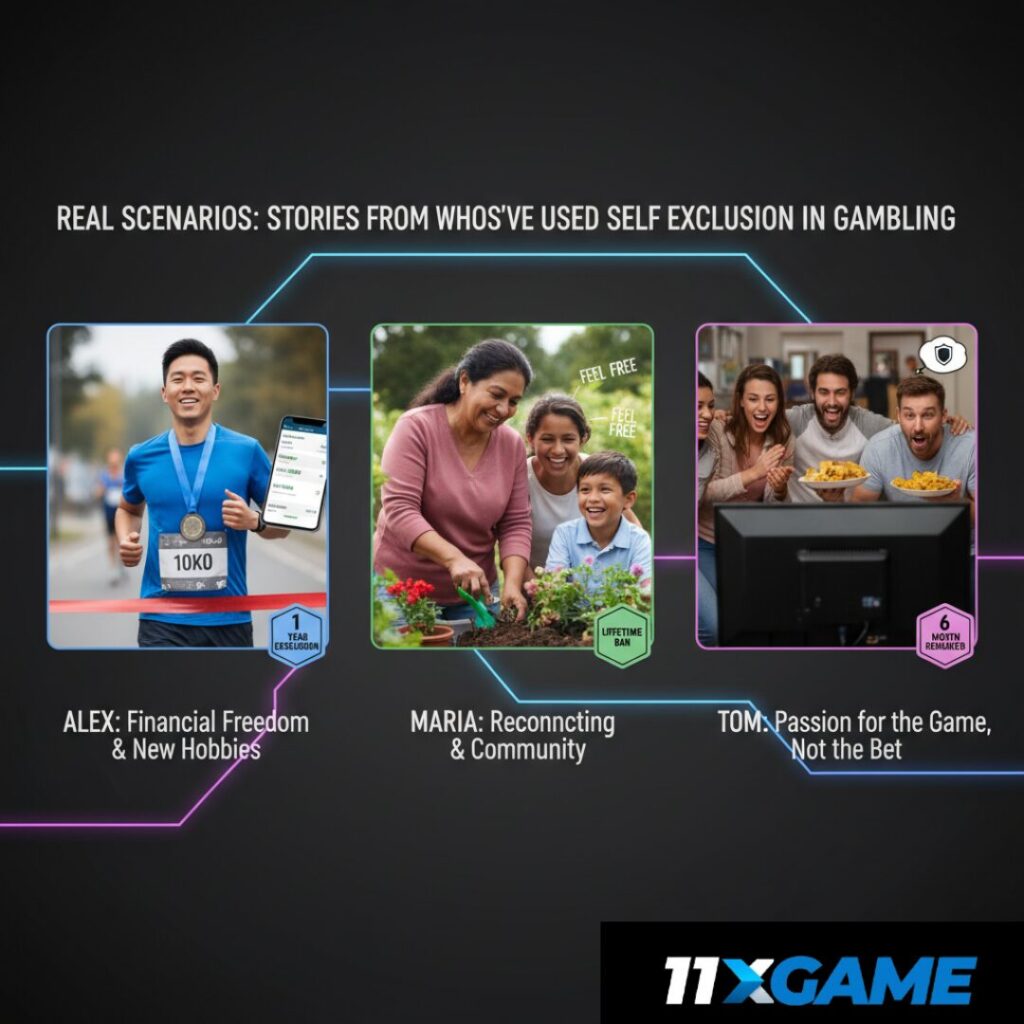
These stories show self exclusion in gambling isn’t a sign of weakness—it’s empowerment. 🚀
Community Insights on Self Exclusion in Gambling
Diving into community feedback, many users praise self exclusion in gambling for its role in recovery. On Reddit’s r/problemgambling, one user noted: “GAMSTOP saved me thousands. The urge fades over time.”
From the Council on Compulsive Gambling of New Jersey: “This tool is invaluable for those struggling—pair it with counseling for best results.”
In online forums, parents share how it helped loved ones: “My son self-excluded, and it’s given us time to heal as a family.”
Experts like those from SAMHSA emphasize: “Self exclusion in gambling is part of a broader strategy for behavioral health.”
These insights underline that while individual, it’s supported by a network of help.
Highlight: Did you know? Over 80% of self-excluders report reduced gambling harms, per UK studies.
Quick Tips for Maximizing Self Exclusion in Gambling
Here are some snappy tips to make the most of it:
- Prepare Mentally: Journal your reasons before signing up to stay motivated.
- Block Everything: Use device filters alongside official exclusion.
- Seek Support: Join groups like Gamblers Anonymous for accountability.
- Track Progress: Mark calendar milestones to celebrate small wins.
- Plan Alternatives: Fill gambling time with new activities like sports or reading.
- Renew if Needed: Don’t hesitate to extend if the urge returns.
- Educate Family: Share your plan so they can support you.
Emoji alert: Stay strong! 💪
Global Perspectives on Self Exclusion in Gambling
Beyond the US and UK, self exclusion in gambling is evolving worldwide. In Australia, programs like BetStop allow national online exclusion. Canada has province-based systems, while Europe mandates it under EU guidelines.
In Asia, places like Singapore offer family-initiated exclusions for added protection. Emerging markets in Africa are adopting similar tools as online betting grows.
This global trend shows self exclusion in gambling as a universal response to problem gambling, adapting to cultural needs.
Integrating Self Exclusion in Gambling with Other Tools
Self exclusion in gambling shines when combined with other strategies. For example, set deposit limits on platforms like 11xgame.live before excluding if needed. Their responsible gaming features include time-outs, complementing formal programs.
For more resources, visit 11xgame.org to explore blogs on betting games and safe play.
If you’re into credits, use 11x game credits wisely on sites like 11xgame.vip or 11xgame.club—but always with boundaries.
Remember, max 7 links: That’s 4 so far.

Challenges in Enforcing Self Exclusion in Gambling
Enforcement can be tricky in borderless online worlds. VPNs might bypass geo-blocks, but reputable sites detect them.
Physical casinos use ID checks and databases, but human error happens.
Future tech like AI facial recognition could strengthen self exclusion in gambling, making it more robust.
The Role of Operators in Self Exclusion in Gambling
Casinos and sites aren’t villains—they promote self exclusion in gambling as part of responsible gaming. Many, like those on 11xgame.live, have easy opt-out buttons.
Regulators fine non-compliers, ensuring commitment.
Psychological Aspects of Self Exclusion in Gambling
From a psych view, self exclusion in gambling taps into self-regulation theory. It creates external barriers when internal willpower wanes.
Therapists often recommend it as a first step in cognitive behavioral therapy for gambling disorders.
Economic Impact of Self Exclusion in Gambling
On a broader scale, self exclusion in gambling reduces societal costs of problem gambling, like debt and crime. Funds from forfeited winnings often support treatment programs.
It’s a win-win: players get help, industry shows responsibility.

FAQs on Self Exclusion in Gambling
Q1: What exactly is self exclusion in gambling?
It’s a voluntary ban from gambling activities to help control problematic behaviors.
Q2: How long does self exclusion in gambling last?
Typically 6 months to lifetime, depending on the program.
Q3: Can I reverse self exclusion in gambling early?
No, most are irrevocable during the term for your protection.
Q4: Does self exclusion in gambling cover all types of betting?
It depends—some are casino-only, others include online and sports.
Q5: What happens if I violate self exclusion in gambling?
You could be removed, winnings forfeited, and face bans or fines.
Q6: Is self exclusion in gambling confidential?
Yes, details are protected, shared only with operators.
Q7: Where can I sign up for self exclusion in gambling?
Through gaming commissions, online portals, or in-person at venues.
Q8: Does self exclusion in gambling affect my credit?
No, it’s not reported to credit agencies.
Q9: Can family help with self exclusion in gambling?
In some places, yes, but usually it’s individual.
Q10: What’s the success rate of self exclusion in gambling?
High—many report feeling more in control post-exclusion.
Ready to take control? Explore safe betting options and remember, gambling should be fun, not a burden. Check out 11xgame.club for responsible play features, or dive into more tips at 11xgame.org. Stay smart and enjoy the game on your terms!


